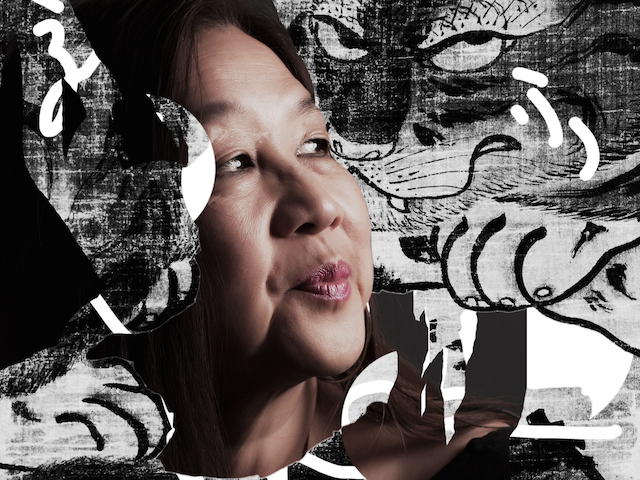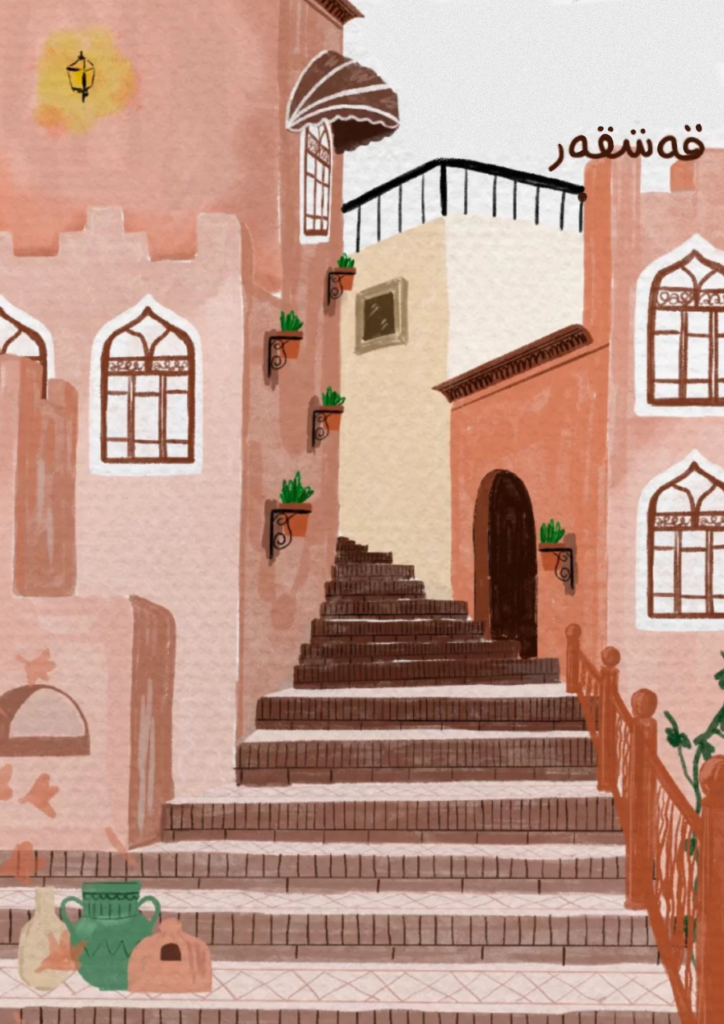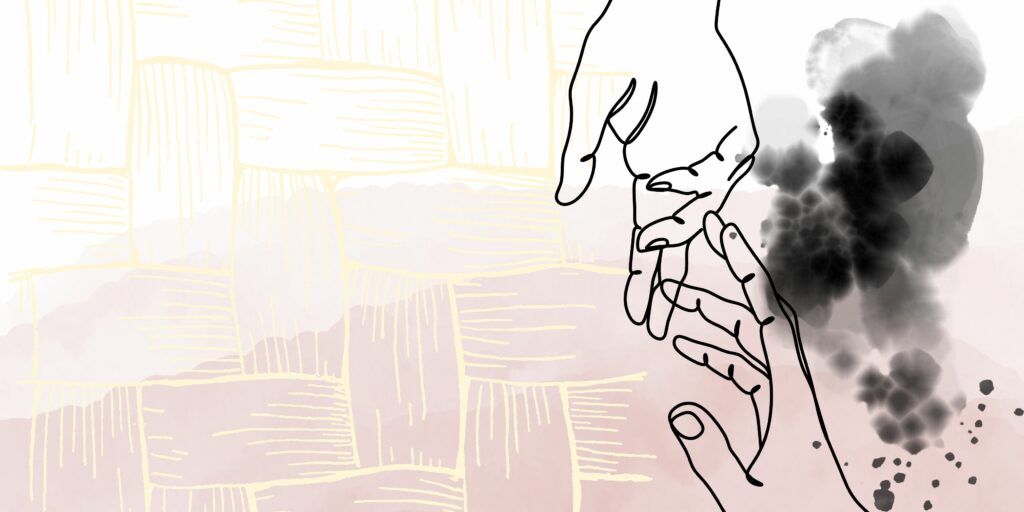Marilyn Chin talks bad girl haikus, pissing off your ancestors, and her new career-spanning collection, A Portrait of the Self as Nation.

October 17, 2018
Marilyn Chin’s A Portrait of the Self as Nation, which features new and selected poems, is a wild swerve through language, resistance, and identity. These poems are feral and rebellious—playing with formal and sonic expectations. A Portrait of the Self as Nation spans thirty years of Chin’s ever evolving and revolving work. In it, she writes boldly of love, war, exile, feminism, justice, and joy. In the title poem, Chin writes: “We were fierce, yet tender/fierce and tender.” A wild girl poet, dangerous professor, and transnational translator, she is a vital force in Asian American literature. This book is full of rich subversion–dotted with glitter, rancid chow mein, and bad girl haikus. Reading A Portrait of the Self as Nation is a cosmic experience. Dear Reader, prepare for your head and heart to spin. Marilyn Chin’s imagination is expansive. She’s the real deal.
—Jane Wong
Celebrate the publication of A Portrait of the Self as Nation with a reading and Q&A with Marilyn Chin at Poet’s House on Thursday, November 15 at 7 pm.
Jane Wong
In your preface to your new and selected, you write about inventing a “fusionist aesthetic” and engaging bilingual and bicultural forms. Can you talk a bit more about what it means for you to rework and create your own forms? I love that you write “bad girl haikus.” Are these fused forms a kind of rebellion?
Marilyn Chin
Very early in my poethood, I said to myself that I don’t want Ezra Pound to have the last word on Chinese poetry. So, I studied Chinese poetry for years so that I could argue with this madcap modernist stepfather. Also as an immigrant poet, I wanted to build a diasporic Asian American aesthetics. There were not many models before my generation. I have been patiently working on these “bicultural” forms and variations. I believe that through cross-pollination, we’ll get innovation. That’s the pioneering immigrant spirit. We are building the railroad! Thousands of us in sweatshops help “create” American civilization but we don’t often get the credit for it.
I began my poetry career “struggling” against certain misconceptions: the stereotypes that Asian Americans are rote-learners and that we can’t speak English properly and that we should stay with the sciences and not play in this highbrow beloved complex genre of Shakespeare and Donne and Keats—I wanted to prove them wrong, and began my journey securing knowledge. I spent most of my life honing my poetry chops.
The “Chinese American quatrains,” “sonnetnese,” “bad girl haiku,” the iconoclastic sonnets—“So, You Fucked John Donne”—the variety of immigrant anthems, elegies, yellow girl blues poems, border ghazals, haibun, wild girl tales, grandmother koans, “epic love poems,” as you call them, long DuFuian sequences and epigram-like jewels and oppositional ancient and living voices that merge together in my writing: I wanted to hijack the traditions, mix it up, and “make it new” but with a long shadow of the Pacific Rim all over it and a big dose of social and feminist critique. I wanted to prove that ethical concerns and aesthetic concerns are not mutually exclusive.
The 21st century is filled with critics who hate poetry but I began my journey loving this amazingly rich genre. I never tire of experimenting with bicultural forms and giving myself a big canvas to play in.
I was rebellious from the start. I was born a Chinese girl in a cold water flat in Hong Kong. Underweight and colicky. Nobody wanted another sickly girl to feed. Throughout history, the Cantonese were noisy and rebellious. They often lose the fight, but they’re fearless. I didn’t become a doctor or computer scientist. I loved poetry and became a poet against all odds! I’ve been wearing those fisticuffs for the long haul, to stir things up and both honor and subvert the great art from both sides of my literary heritage.
It’s no fun if you don’t piss off and embarrass your ancestors.
JW
Yes to fearlessness and honor and embarrassing your ancestors by subverting tradition! Throughout your poems, I’ve been enamored by your subversion and lyricism in terms of imagery, sound, and the speaker’s voice. There’s always a bit of sharp humor and side-eye refusal in your work: “it ain’t all randy dandy/in the new kingdom.” Or later in a newer poem: “the volta is loving my vulva lapping vodka on the Volga!” I’m curious about your process. How do you go about beginning a poem? And how does playfulness and surprise fit into your craft?
MC
Ha! “The volta is loving my vulva lapping vodka on the Volga” is actually an inspired sonic, a raunchy riff. In that poem, I had great fun creating a syncopated Californicated Whitmanesque catalog. I love Whitman for his unbridled joy and verbal acrobatics. The poem is trying to teach the reader about a golden moment in Asian American literary history, but is simultaneously fun and entertaining: “You and me and Emily D. / Gnawing ganja cookies, dreaming on our backs!”
My imagination is restless and is inspired by everything! I am inspired by rhythms I hear in everyday speech and music as well as while reading the great classics. I can still hear the poems my grandmother chanted to me in Hong Kong and the Cantonese opera records my mother played and the Chinese tongue twisters on the playground. I studied Classical Chinese poetry to really get at the Chinese line, parallelism, precision, aural and visual punning. I’m always testing the “edges” of propriety and impropriety. I remember the vivid swear words that the cooks hurdled at each other in my uncle’s restaurant then, I blend everything into the Western canon. Yesterday, I reread Shakespeare’s Macbeth, Du Fu’s later poems and listened to hours of raunchy Nicki Minaj and some Kendrick Lamar, too, in a single day. Why not? I love poetry in all guises.
I like to play, but as you know, writing poetry can be torturous. Long months of contemplation and gestation, moments of wild joy, paralyses that often follow a fine flow, lots of revision and self pity. Aggh! And it’s so freaking lonely; writing is a solitary sport, working on a single line for hours only to discard it. Ultimately, a good poem must give the reader a rich experience that she can’t get elsewhere. It involves rigorous craft to bring on the magic and make it all look playful and effortless.
JW
Speaking of rigorous craft and richness, I keep returning to your title poem of the collection, “A Portrait of the Self as Nation.” This is an epic love poem, beautifully salacious, refusing the “chastity that will save the nation,” and transtemporal, too. We move across centuries and even the page itself: “You, my precious reader, O sweet voyeur…” This poem struck me deeply in all its complications: “Lover, destroyer, savior!” How we want, how others want us. The body, the nation. The last two lines encapsulate how I feel whenever I read your work: “We were fierce, yet tender / fierce and tender.” Can you speak more about this particular poem and how these last lines act as a kind of poetics?
MC
Adrienne Rich really loved “A Portrait of the Self as Nation.” I like how you coined it “an epic love poem.”
Yes, it does have grand ambitions. It’s an anti-war poem disguised as a love poem/epyllion. It’s a dramatic monologue in which the speaker and the listener have multiple identities. The speaker is Mei Ling, the poet as well as the nameless oppressed, a fragile, impoverished country trapped in a proxy war. She is the beloved but subjugated woman, the dark-skinned other, and more. The addressee is the dominant male figure, warrior, killer, savior, oppressor, the occupier, the colonialist, the dominatrix, the Lord and even the reader is implicated (strangely enough). I wanted to show that identity is not static; we are tied to blood and history. I wrote this poem on the occasion of the first Gulf War, and then the second Bush war happened and the poem continues to be relevant, given the continuous conflict and humanitarian crises brought on by war. “Dune and dunes of sand” moves to “fields and fields of rice.” It is a hovering view of devastating American wars.
The poem historically shifts to Chinese immigration and even ponders a moment on my own personal naturalization process. The shifting of history, voices and ideas worked magically in the poem. It’s a love poem that slowly opened up toward a poem that questions American power and identity and the unequal power between the sexes, between the oppressor and the oppressed. Between rich nations and smaller subjugated nations. When I reread the poem last week to prep for this interview, I was amazed at the grand scale of the poem—I have no idea how I was able to throw the complex ideas together. The muse zapped me, and then, it took me three years to make the final version.
My long poems take many drafts and years to write. Sometimes I would write twenty pages and pare down to five or seven. I work out the shape and voices as I proceed. There are long poems and sequences that I was not able to include in this collection given space limits. I hope that the reader will go back to my individual books and rediscover them.
Yes, “fierce and tender” could be a “kind of poetics” as you say. It’s difficult to describe the ingenuity that goes behind writing a poem, especially, when I write in such a wide range of forms, styles and hybrid variations. I am committed to writing a poetry of social engagement. Most revolutionary types are idealists. We believe that art can transform and improve society. For all the anger, grief and critique in my art, ultimately, I am a love poet and believe in love and tenderness. Yes, cheesy! Baa! Don’t call me a romanticist! I’m too cynical for that.
JW
Love poets! Yes! I feel like I am a love reader too. I sense that in your translation work. I was particularly struck by your translation of Hồ Xuân Hương’s work–a Vietnamese poet born in 1772. Her work is so visceral and grotesque. From “Snail”: “Night and day I crawl in smelly weeds,” and from “Wasps”: “Itchy little wasps sucking rotting flowers.” I felt a deep connection between her work and your own. Feminist and sexy—deeply felt in the body and its guts. From “Twenty-Five Haiku”: “Cuttlefish in my palm stiffens with rigor mortis, boy toys can’t love” and “I plucked out three white pubic hairs and they turned into flying monkeys.” I love it!
Tell me more about what the process of translation is like for you. What is that relationship like? Why are transnational connections so key for you? Are there other feminist artists you admire across time and space?
MC
My undergrad degree was in Chinese literature and I began translating poetry when I was twenty. In a class called Chinese Dialectology I studied how Cantonese poets used Classical Chinese characters but also invented their own words to represent Cantonese speech that can’t be vocalized in the common Chinese characters. The Vietnamese Chữ Nôm also used Chinese characters as well as creating their own. In fact, sonically, the Vietnamese language has more kinship with Cantonese than with Mandarin. At the Yenching library at Harvard, I trotted out both Cantonese and Chữ Nôm poems and folk songs and love poems. Some of these songs are very salty with double entendre. I discovered Hồ Xuân Hương’s poems in my research and was immediately drawn to her.
Again, as a Chinese American poet who wants to take back Chinese poetry from Pound, I wanted to create my own “imagism.” I learned how to craft images, to weaponize them in a way that makes the reader stop in their tracks. Perhaps this is my way of empowering myself to engage with the modernist legacy. I still have reams of material on Cantonese love songs in my drawers. Alas, so many projects and so little time!
For this collection, I included some translations of Ho, Ai Qing and Gozo. As you can see, these three poets are very different. I tried to inhabit their voices in an unobtrusive, sympathetic manner. I tried to understand their motivation and aesthetics, their historical context, their personal projects. I channel them with the deepest respect. I have hundreds of pages of translation that I have not published in book form. I worked on Du Fu translations but decided to keep them as my guiding spirit and not try to publish a book. I don’t want to publish just to publish. I want to learn from poets as you say–to cross history and language borders.
I have somewhat a transnational life. I can’t seem to sit still. I had a nightmare where Trump came into my bedroom and took away my citizenship papers. The imagination must have the freedom to play. Sometimes, I feel like a citizen of the world. Sometimes, I’m bitterly solitary and feel stateless. But, of course, I have an American passport, which I understand is a privilege. I am not stateless but am a restless perambulator.
JW
Your work always surprises me and continues to be raucous and subversive. I loved returning to poems I’ve read over the years in this collection, like “How I Got That Name.” I teach this poem each year and my students always return to it; we spend so much time just talking about the word “that.” And then the self-obituary at the end! We often talk about creating one’s own world of belonging. What is it like for you to return to poems like “How I Got That Name” that have been anthologized and shared widely?
MC
Gosh, I am moved that poetry teachers take time to unpack and teach my work. “How I Got that Name” is almost thirty years old. It was first published in the Iowa Review in 1990.
I often begin my readings by reciting “How I Got that Name.” It’s like you go to a Led Zeppelin concert and you gotta hear “Stairway to Heaven.” If I don’t read it, someone in the audience would shout, “Read the name poem!” It’s become a signature poem and an Asian American anthem. Personal, literary and political! And I think there are funny parts, too. It asserts and inserts a Chinese American girl poet into the culture.
JW
In a selected collection, I’m always anxious to read new poems too and I am so glad to have new poems in here. I love the forward energy and badass sisterhood of “For Mitsuye Yamada on her 90th Birthday” (yes to using more exclamation points in poetry!) Across your writing journey, how have you evolved and what has stayed consistent? And what are you working on nowadays—what are your obsessions, your new fusions, your vices, your loves, your radical refusals and radical joys?
MC
I organized the book somewhat chronologically, and you can see how I’ve developed my ideas. I tried every freakin’ form in literary history and tried to bend them into my own Chinese American aesthetics. You could trace the history of the quatrain through my work. The influences from the Shijing to the Tang dynasty poets to Dickinson to Irish ballads. I keep thinking that I would tire of quatrains, but then, I wrote the “Little Box” series recently. I have been writing prose poems and haibun, which developed into my weird magical fiction book Revenge of the Mooncake Vixen. Immigrant anthems shapeshifting from lyric to prose manifestos. Presently, I am rhyming a lot, because I’ve been listening to hip hop! I am also writing more magical fiction or prose thangs. I think I’m writing funnier and with a satirical edge! I guess I am responding to Trumpian injustice and absurdism.
I guess my “radical refusal” is to play it safe and just write one kind of poem. Or try to please the literary regime of the moment. I have lived long enough to know that trends come and go. The poetry establishment—whatever that is, maybe the MFA beehive, or the twitter-verse, or a few ambitious critics will set trends. I try to keep focused on “the work” in front of me and hope that I am making art that is interesting and special and actually has important meaning and not just succumb to the sheepfold.
Audre Lorde says that “poetry is not a luxury” it is a necessity. Poetry is my “radical joy!” It’s a place where I could contemplate, cry, shout, love, kiss, scream… perhaps nobody is listening. And nobody cares that I am building some kind of hybrid Chinese American creature in my basement. I am grateful for my freedom.
JW
Radical joy, yes! I am so grateful for poetry and for your writing. I will always be impacted by one singular moment in my life: when you asked me and poet Sally Wen Mao in Boston if we were “wild girl poets.” We said “YES!” immediately. I’ve been thinking a lot lately about wild girl poetics and Asian American women writers and how you’ve always been at the forefront of that resistance, refusal, and joy in community. From reading The Phoenix Gone, The Terrace Empty when I was in college to that tap on the shoulder in Boston, I’ve been enamored with your work and all that you do for our vibrant Asian American writing community. What do you see and hope for a future of Asian American women poets? What does being a wild girl poet mean for you?
MC
Ha! Well, I am heartened to see so many young poets of color and Asian American poets writing and publishing. Great organizations such as the AAWW, Kundiman and VONA have been supportive and influential.
Actually, there is a lot going on all over the web. Wild girls spewing poetry and sass, I love it. I am happy to see that you have a supportive community. When I was at Iowa, there were just a handful of us. Now there are so many fresh names. Perhaps we’re having an Asian American renaissance.
I wrote the birthday poem for Mitsuye to celebrate her generation and to honor some pioneering wild girls. They did not come out of the workshop. Some of them were true activists: Mitsuye worked tirelessly for Amnesty International. Janice Mirikitani fed the hungry at Glide Church. Nellie Wong was a leader in the Socialist Party. Fay Chiang worked for the Henry Street Settlement.
We must think about their sacrifice as we write our poems. The earlier “wild girl Asian American poets” rolled up their sleeves and did the activist work. We must continue “the struggle” toward creating a just and better world. As artists, we must not take our privilege for granted. We must do our best. We are a privileged lot. Perhaps the epigram [to this interview] should be: “Wild girls seek justice through writing poetry.” How weird and beautiful is that?



